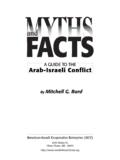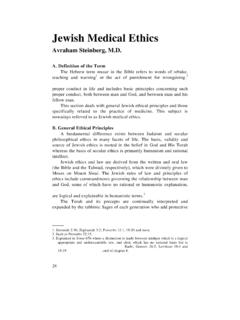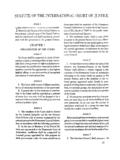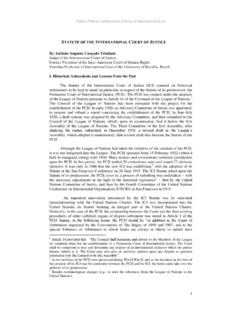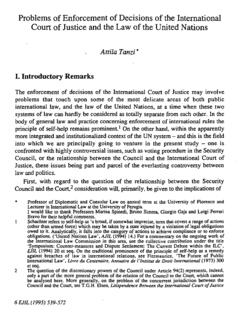Transcription of International Court of Justice - Jewish Virtual Library
1 International Court of Justice Request for an Advisory Opinion from the 10th Emergency Special Session of the United Nations General Assembly on the legal consequences arising from the construction of the wall being built by Israel Written Statement of the Government of Israel on Jurisdiction and Propriety 30 January 2004 ii [This page is intentionally blank] OPENING STATEMENT The reality of Israel today is that of an ongoing terrorist threat of the gravest proportions. Israel faces 40 to 50 significant security alerts every week, each one threatening an attack such as that carried out at the Park Hotel in the coastal town of Netanya on 27 March 2002 in which 30 people were killed, most in their 70s and 80s, and 145 others injured, by a suicide bomber from Tulkarem. In that same month, March 2002, by suicide bomb and other attacks, 135 people were killed and over 721 injured in 37 separate incidents.
2 Over the past 12 months, as a result of more stringent security, the number of casualties have begun to decline. Yet terrorist attacks have still killed 218 people in this period and injured around 850 others. In one of the most horrific of these attacks, at Maxim s restaurant in Haifa on 4 October 2003, two families lost 5 members each, across three generations, to the suicide bomber. On 8 December 2003, the 10th Emergency Special Session of the United Nations General Assembly requested an advisory opinion from the International Court Justice on the legal consequences arising from the construction by Israel of a wall in Occupied Palestinian Territory . The resolution requesting the advisory opinion is silent on the reasons why such a barrier is necessary. Twenty paragraphs of text preceding the request for an opinion say nothing not a single word about Palestinian terrorism directed against Israeli civilians and the ongoing reality of such attacks which have left 916 people dead and over 5,000 injured, many critically, in the past 40 months of violence.
3 The extensive dossier of 88 documents provided to the Court by the United Nations Secretariat to assist the Court in its work is likewise silent on the subject. The dossier purports to provide all relevant resolutions of the General Assembly and Security Council. Yet noticeable by its absence is any reference to Security Council resolution 1373 (2001) in which the Council reaffirmed that acts of terrorism, like those which have become the Palestinian modus operandi against Israeli civilians, constitute a threat to International peace and security. Resolution 1373 (2001), as do other resolutions of both the Security Council and the General Assembly which are omitted from the dossier, also reaffirms the duty to refrain from organising, instigating, assisting or participating in terrorist acts. Israel is called to the bar of the Court by a resolution which was crafted and nurtured by the Palestinian Liberation Organisation ( PLO ).
4 The PLO, as Palestine , has been invited to participate in the proceedings of the Court and assail Israel on questions of law which challenge (i) Israel s right to defend its citizens from attack. Yet it is the PLO, through Fatah, the Al-Aqsa Martyrs Brigades and its wider authority in the West Bank and Gaza, that is behind many of the most murderous attacks directed at Israeli civilians. In the most recent of these, on 14 January 2004, a young woman from Gaza, pleading illness and a prosthetic limb, managed to evade Israeli security to detonate her bomb to cause maximum casualties. Four Israelis were killed in that blast. The Al-Aqsa Martyrs Brigades, closely associated with Yasser Arafat s Fatah party, was involved in the attack. These acts of terrorism violate all established rules of customary and conventional International law.
5 Yet responsibility for and the legal consequences of these attacks are not part of the request for an opinion from the Court . Those most responsible for the attacks are effectively given free rein in the proceedings. There is a travesty of imbalance in the exercise in which the Court is now engaged. Israel s written statement addresses the jurisdiction of the Court and the propriety of any response by it on the substance of the request. It does not address the legality of the fence, legal consequences that flow from it or other matters pertaining to the question of substance presented to the Court . Israel considers that the Court does not have jurisdiction to entertain the request and that, even were it to have jurisdiction, it should not respond to the requested opinion. The request for an opinion is ultra vires the competence of the 10th Emergency Special Session of the General Assembly by reference to the very rules by which the session was convened.
6 Under the Uniting for Peace Resolution, the Emergency Special Session is only competent to act in circumstances in which the Security Council has failed to do so on the matter in question. Yet the Security Council did act, adopting, by unanimous vote, resolution 1515 (2003) endorsing the Quartet co-sponsored Roadmap just 19 days before the request for an advisory opinion was made. Moreover, any opinion from the Court on the substance of the request will without doubt upset the balance of the Roadmap and make any meaningful resumption of negotiations more difficult to achieve. The Court has a discretion whether to give the requested opinion. In the past, it has emphasised that it would refrain from giving an opinion when to do so would be incompatible with its judicial functions. This is just such a case.
7 Palestine does not come to the Court with clean hands. The process is tainted. It is an abuse of the advisory opinion procedure. The (ii) question is unbalanced. The Security Council has acted to different effect. And any response on the substance of the request would undoubtedly cut across the Roadmap initiative. In Israel s submission, the Court should decline to give a response on the requested opinion. * * * (iii) (iv) TABLE OF CONTENTS Page PART ONE: PRELIMINARY MATTERS .. 1 CHAPTER 1: INTRODUCTION .. 3 CHAPTER 2: ISSUES OF FAIRNESS AND NATURAL Justice .. 9 A. The Title Given to the Case .. 10 B. The Fixing of Time-Limits .. 12 C. The Participation of Palestine in the Proceedings .. 13 D. The Application of Article 17(2) of the Statute .. 15 E. The Secretary-General s Report and the Secretariat s Dossier.
8 16 CHAPTER 3: ESSENTIAL CONTEXTUAL MATERIAL .. 19 A. The Relevance of Context .. 19 B. The Israeli-Palestinian Conflict and Attempts to Find a Settlement .. 19 (i) Initiatives Within the United Nations .. 19 (ii) The Madrid Process .. 20 (iii) Exchange of Letters Between the Prime Minister of Israel and the Chairman of the PLO, 9 10 September 1993 .. 20 (iv) Declaration of Principles on Interim Self-Government Arrangements, 13 September 1993 .. 21 (v) Israel PLO Agreements and Undertakings, 1994 1999 .. 22 (vi) The Mitchell Committee Report .. 25 (vii) The Roadmap and Related Developments .. 26 (a) Background Issues and the Involvement of the United Nations Security Council .. 26 (b) The Roadmap and Security Council Resolution 1515 (2003) .. 29 (c) Subsequent Developments in the 10th Emergency Special Session.
9 33 C. Borders, Jerusalem and Settlements Under the Israeli-PLO Agreements and the Roadmap .. 38 (v) D. The Palestinian Terrorist Threat to Israel .. 40 (i) The Perpetrators of Terror .. 41 (ii) The Methods and Means of Terror and its Victims .. 44 (iii) The Threat of Mega-Terror Attacks .. 49 (iv) The Responsibility of Palestine for Palestinian Terrorism .. 50 PART TWO: OBJECTIONS TO JURISDICTION .. 55 CHAPTER 4: THE REQUEST IS ULTRA VIRES THE COMPETENCE OF THE 10TH EMERGENCY SPECIAL SESSION AND/OR THE GENERAL ASSEMBLY .. 57 A. Introduction .. 57 B. Background .. 58 (i) The Convening of the 10th Emergency Special Session of the General Assembly .. 58 (ii) The Uniting for Peace Resolution .. 61 C. The Exercise by the Security Council of its Primary Responsibility in Respect of the Israeli-Palestinian Conflict Subsequent to the Convening of the 10th Emergency Special Session.
10 64 D. The Advisory Opinion Request is Ultra Vires the Competence of the 10th Emergency Special Session and/or the General Assembly .. 71 (i) The Advisory Opinion Request is Ultra Vires the Competence of the Emergency Special Session Under the Uniting for Peace Resolution .. 72 (ii) The Advisory Opinion Request Would Have Been Ultra Vires the Competence of the General Assembly Convened in Regular Session .. 77 CHAPTER 5: THE REQUEST DOES NOT RAISE A LEGAL QUESTION WITHIN THE SCOPE OF ARTICLE 96(1) OF THE CHARTER AND ARTICLE 65(1) OF THE STATUTE .. 83 A. The Requirement that the Request Should Raise a Legal Question .. 83 B. The Question is Uncertain and Incapable of Response Within its Terms .. 85 (i) The Underlying Assumption of Illegality .. 85 (ii) Legal Consequences for Whom? .. 87 C. Conclusions .. 88 (vi) PART THREE: PROPRIETY AND THE EXERCISE OF DISCRETION.
